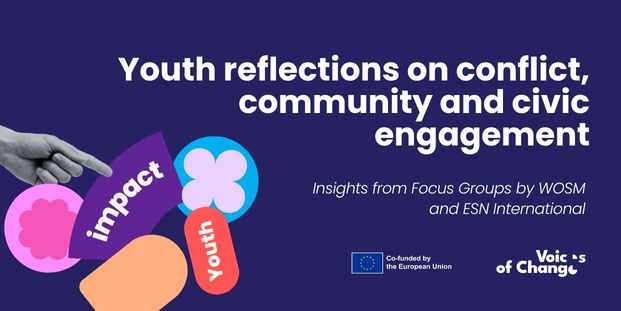
As part of the Voices of Change project, the Erasmus Student Network joined efforts with the World Organization of the Scout Movement (WOSM) to explore how young people understand and respond to the challenges shaping their communities. Through two focus group processes - one held in person at the European Youth Centre Budapest with youth from all across Europe (3-7 March 2025) and another conducted online (24 April 2025) with young people from France and Portugal - this initiative gathered powerful insights into youth perspectives on peacebuilding, civic engagement, and the role of young people as changemakers.
The first process, organised by WOSM and the Council of Europe, brought together youth workers from across Europe to reflect on the links between identity, conflict, and the role of youth organisations. Participants explored their own beliefs and questioned how their organisations approach neutrality, inclusion, and peace education. Many spoke of a disconnect between their personal convictions and the cautious stance of institutions, especially in moments of crisis. Exercises in visual storytelling and creative modelling helped surface concerns ranging from political polarisation to a lack of formal training in conflict resolution. The session concluded with a policy-oriented dialogue, where participants called for stronger support for grassroots actions, the inclusion of peace education in schools, and greater recognition of youth as peace actors.
Parallel to this, ESN International hosted an online focus group with young people living in France and Portugal to better understand the local realities faced by youth. Participants described feeling like outsiders in their own communities - present, but rarely heard. Rising costs of living, unsafe public spaces, and a sense of powerlessness in decision-making processes were recurring themes. Despite this, they expressed a strong desire to contribute, motivated not by convenience but by purpose, values, and peer support. What they asked for was not hand-holding, but structural support: clearer pathways to get involved, accessible training, and recognition of the important role youth-led initiatives play in shaping society.
Together, these two sessions - one rooted in peacebuilding, the other in civic engagement - paint a clear picture. Young people are navigating increasingly complex environments marked by insecurity, inequality, and institutional inertia. Yet, they remain eager to act. They seek spaces to reflect, tools to act, and trust to lead.
The findings of these focus groups will feed into the development of a new self-assessment tool under the Voices of Change project. This tool will help young people better understand their surroundings, reflect on their role as agents of change, and identify the steps they can take - locally, regionally, and across Europe - to make a difference.
You can check the full report here:


Follow ESN